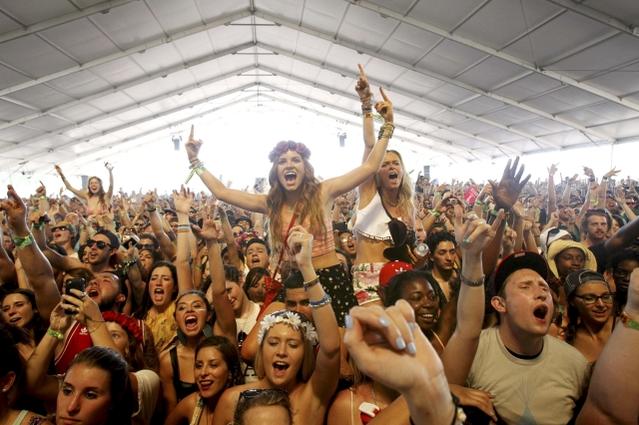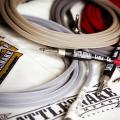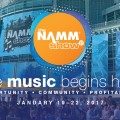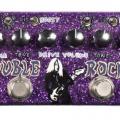Typically here on EffectsBay, I like to keep things positive. But I think this PSA which initially appears bad, might actually be positive. If it helps one band in the world, then I’ve done my job.
This post was inspired by Just Nick’s series – “Don’t be a douchebag guitarist“. I loved that series, and there were definitely times in my guitar-life that I broke some of these rules, and now, I try really hard not to be a douchebag guitarist. Thanks Just Nick!
I was thinking we should have one for bands in general. A little back story and to understand where I’m coming from. I’m in a indie band. I typically play in small bars – mostly crappy/divey bars, but we also have an opportunity to play on some good stages too. We also go on tour a few times a year and played in a good handful of cities from the west cost to Ohio. Playing over hundred shows, I’ve become an observer of band behavior. I see what touring bands are like, I see what local bands are like and how things can improve – because sometimes, it drives me nuts on how bands act.
Typically, it’s the local bands that could use some help and adjustments, because they’re not familiar with the ‘unsaid’ or ‘implied’ rules when playing with others. So.. let’s start.
PSA: Don’t be a douchebag band
Don’t show up with any gear – You think this would be pretty obvious. But to show up to a gig with the assumption that you can borrow other peoples’ gear. Not cool. Coordinating ahead of time and arranging the sharing of gear – totally cool.
Don’t force the other bands to use your gear – Sort of the opposite as above. So you’re the “headlining” band and you set up all the gear before the other bands show up. Typically, this is a ‘local’ move. The touring band has been driving their gear across the country, and now are expected to leave the gear in the van and force the guitarist to play through a crappy Peavey amp and making the drummer use a double kick. Not cool. Again, if something is arranged ahead of time via a phone call and worked out and agreed upon – totally cool, but don’t try to strong arm your position before the others even show up.
Don’t say one of your bandmates need to work in the morning, so you want to play first – Another classic local move. First off, we all need to work in the morning. Even the touring band needs to drive 300 miles the next day. I get it, it’s late, but all of us here are hanging out late at night. Don’t be douchey and just play the slot you got. The worst is when the band plays first – because someone needs to work early in the morning, yet, you see the said person at 2AM drunk. Re-al cool.
Don’t say one of your bandmates is working late and your band needs to play 2nd or last – Oh. My. God. Such local band move. This is one that drives me nuts. It’s called scheduling. If you can’t make the schedule (the show was booked for weeks if not months ago) you need to be proactive. As a band, you know there is a scheduling conflict pretty early on. The right thing to do is to call the booker with the situation when you find out there is a conflict. The booker will either say okay and arrange things (and communicate with the other bands) or find another band to replace you ahead of time. Don’t show up with 3/4 of your band minutes before playing and saying that.
Don’t negotiate your slot – Again, similar to above, and typically local band move. The classic situation for indie touring bands is to get the coveted second slot. Unless you’re popular and well known, chances are you’re on the road playing a town where NOBODY has heard of you. So your status is far below local status in that town. Rough spot to be in. By playing second, you’re sandwiched between openers that hopefully draw and will stick around for the whole night. Everyone, including the venue is happy with this set up. With the touring band playing first, people will show up late, and if the touring band plays last, everyone will leave before they play. Sucks for the touring band. Sucks for the venue. It’s hard for those touring bands to get there – get told by the venue you’re playing second, and when the other bands arrive, the negotiations happen and you end up playing first or last (usually because of the two earlier don’ts I mentioned above). Let the venue dictate the slots for the good of the venue (remember – if the venue does good, that usually translates to better pay). If all the bands are local, the game is different. Nobody wants to be last. The right thing to do, again, just follow the original plan by whomever put the show together.
Don’t tell your friends/family what time *you’re* playing – This is a hard one. I get asked this question. I get it as the publics point of view. They want to see you, and don’t care about the other acts. Nothing worse than a local band playing, that draws and people only show up right before they play and as soon as they’re done, the house clears out. I believe people will follow the leadership of that band. If the band encourages people to stay and come early, I believe people do. They public doesn’t realize the other bands like the support as well. As a band, stick around and hang out with your friends. I’ll get into that topic soon.
Don’t be slow with set up and tear down – Touring bands in general are fast. They’re seasoned veterans. I like this saying “Get the F*** On and Get the F*** Off the stage”. GFO! As a band, you should make it a race. Challenge the band to see how fast you can set up and tear down. Those minutes are valuable, especially if previous bands played for too long, you can make some of that time in the transition for bands. Drummers… I’m talking to you. Get your hardware set up before show time back/side of the stage when the band says “We have one more song”. Drummers, I’m talking to you… break your hardware down OFF the stage. That means carry the hardware off the stage and tear it down back/side of the stage while the other drummer can set up. Nothing worse than a drummer that is taking their time setting up and tearing down each piece while the other drummer is giving him the death stare while waiting to get on the stage. Guitar players.. I’m looking at you now. Don’t sit there and talk to friends and perform your version of “Rig Rundown” between sets. Be polite and say you’ll talk to them in a little bit while you get your stuff pulled off stage.
Don’t over extend your set – Talk to the booker as soon as you get to the venue and see how long your set needs to be. Typically, it’s 45 minutes. Sometimes it’s 30 minutes. You should know your songs and make adjustments. If you’re not sure, when you feel like you’re going long, ask the sound guy. He’ll either say you’re fine or you should play one more. One time I remember playing with a band (we were suppose to play 45 minute sets). They were over an hour in, told to play one more (booker was nice), they played one more, then asked the crowd if they should play a couple of more. Super not-cool. Booker shut them down immediately. But what a dick-move.
Don’t leave the show – This is tricky. Let’s say you play first, and you need to leave. There are good ways of leaving and bad ways of leaving. The bad way of leaving, is hauling out all of your gear in the middle of someone’s set. Sometimes this can be super disruptive and distracting for the band performing. Not cool. The way to do this is during the transition. While bands are tearing down and setting up, you could be hauling gear out. As a band, it’s ideal to stick around and watch the performances of the other bands. It’s called support and good vibes. It encourages your friends to stick around too. We’re all trying to put something together that is appreciated by somebody in the crowd.
Not thinking about the touring band regarding pay – What I like to call tour-karma. When on tour every dollar is incredibly important. There are a lot of bills on the road, hotels (if you’re lucky), gas, food, beverages, etc. For an indie band, playing some small venues means incredibly small pay at the end of the night. Sure, there might be some good nights, but that hole-in-the-wall venue on a Tuesday night in the middle of no where, the band might walk away with $20. While on the road, I’ve seen the generosity of the local bands that know the difficulty. We’ve received the cuts from the other bands – which makes it enough to fill the gas tank. As a local band, does that $20-$50 make that much of a difference in your life? You’ll split it up 4 ways.. or put it in the band fund and drive home and sleep in your bed. Or you can get some karma points and give it to the touring band. Trust me, if you’re band goes on the road, you’ll receive the same generosity – hopefully 😉
Wow.. this was WAY bigger than I wanted it to be. Do you guys have anything to add? Comment below.
-
7 years ago
Hey!
being part of a promoting association, in a local band, but with small recognition in the french punk hardcore scene, this article speaks to me.
We try to set up and tear down our gear as fast as we can. Mrs/Mr Singer, i’m looking at you: you probably only have to tear down your mic, IF it is your own (which is not so often the case)…your drummer might need a little help. The fans can wait a minute or two in front of the merch, right ?Now, regarding a possible “Don’t be a douchebag promoter”, here are some hints:
– don’t put the most famous band as first or second band of the night because they’re your friend (or for any reason mentioned in the above article): a lot of people might leave after. You’re the promoter, you must know how the crowd in your city/the venue works and what’s best for the night (not just one band).
– Time is not like a wild musical signal wave: it cannot be compressed!! Don’t schedule 5 bands if your playtime window is 2 hours long. Unless it’s grindcore, I don’t know how grindcore works.
– Make sure to know how long the bands are usually playing and if that doesn’t suit you, find a compromise with the band. I’ve played some gigs where the promoter assumed that we would play 50-55 minutes but our set is fast and we can only push it to 40 minutes max. The opposite also applies: “festival” with only one stage, start at 5pm, 13 bands including ska bands with 1hour-set, asking the crowd if they wanted more (the did!), the promoter said no-thing to them….guess who set up his drumkit at 3:30am ???
– Make sure that there is at least the minimum gear for every band. It is true that if every band assumes that another band will bring a drumkit, it is the band’s faults….but as the promoter, if the show doesn’t happen because there is no gear, you will: look like a fool, make every band look like a fool, frustrate the bands, frustrate the crowd, lose some money, lose some time, be responsible for the loss of time and money from the bands, lose credibility and trust from everyone, etc.Also as promoters, we don’t hesitate to answer “you’ll see” to the “when is this band playing?” question. These people generally get their answer from us, but we love to remind everybody that except for a few accidents, every band is worth a shot. There is always a bar or a place to stay in case you want to pass on the E.T-person whose set consists in touching every available surface with his/her jack after playing and looping a low F with his/her 8-string bass.
Reply -
7 years ago
Great article, particularly the suggestions for drummers to have their gear ready before putting it onstage/removing it before breaking it all down, def good habits to develop. Toured for many years, played in St. Louis at the Creepy Crawl several times. On the club’s site, they had a list of the “Top 39 Annoying Things That Bands Do”, totally classic and thankfully preserved at this link, def worth the read…
Reply
http://www.metalsucks.net/2008/06/17/the-top-39-annoying-things-that-local-bands-do/





